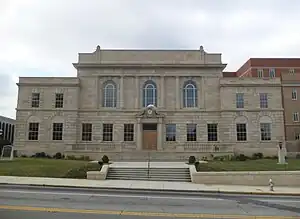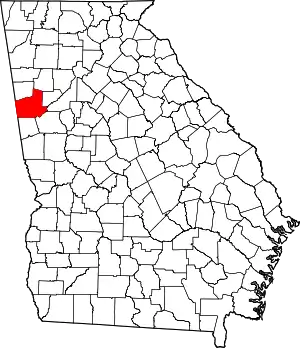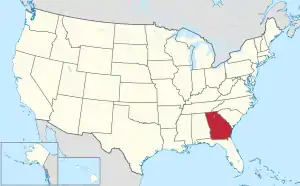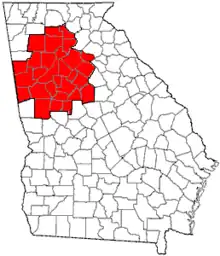Carroll County | |
|---|---|
 | |
 Location within the U.S. state of Georgia | |
 Georgia's location within the U.S. | |
| Coordinates: 33°35′N 85°05′W / 33.58°N 85.08°W | |
| Country | |
| State | |
| Founded | June 9, 1826 |
| Named for | Charles Carroll of Carrollton |
| Seat | Carrollton |
| Largest city | Carrollton |
| Area | |
| • Total | 504 sq mi (1,310 km2) |
| • Land | 499 sq mi (1,290 km2) |
| • Water | 4.8 sq mi (12 km2) 0.9% |
| Population (2020) | |
| • Total | 119,148[1] |
| Time zone | UTC−5 (Eastern) |
| • Summer (DST) | UTC−4 (EDT) |
| Congressional district | 3rd |
| Website | www |
Carroll County is a county located in the northwestern part of the State of Georgia. As of the 2020 census, its population was 119,148.[2][1] Its county seat is the city of Carrollton.[3] Carroll County is included in the Atlanta-Sandy Springs-Roswell, GA Metropolitan Statistical Area and is also adjacent to Alabama on its western border.
History
The lands of Lee, Muscogee, Troup, Coweta, and Carroll counties were ceded by the Creek people in the Treaty of Indian Springs (1825). This was a huge amount of land in Georgia and Alabama, the last remaining portion of the Creeks' territory, and it was ceded by William McIntosh, the chief of the Lower Creek and a member of the National Council. This cession violated the Law, the Code of 1818 that protected communal tribal land. The Creek National Council ordered the execution of McIntosh and other signatories to the treaty for what it considered treason.
McIntosh was killed at his plantation home, at what has been preserved as the McIntosh Reserve. Menawa and a force of 100-150 Law Defenders from Upper Town lands ceded in this treaty carried out the executions of two other men, including Samuel Hawkins, one of McIntosh's sons-in-law. Benjamin Hawkins Jr., another son-in-law, was also named for execution but he escaped, and soon moved to East Texas with his wife and family. Both of the Hawkins brothers were sons of Benjamin Hawkins, the longstanding US Indian Supervisor of the Creek.
The boundaries of Carroll County were created by the Georgia General Assembly on June 9, 1826, but the county was not named until December 14, 1826. It was named for Charles Carroll of Carrollton, at that time the last surviving signer of the U.S. Declaration of Independence, as was Carrollton, the county seat.[4]
When the county was first organized, the legislature designated the county seat as Old Carrollton, Georgia, but in 1830 it was moved to Carrollton.[5]
This county originally extended from the Chattahoochee River to the Alabama state line on the east and on the west, with its northern boundary at the Cherokee Nation, just north of present-day Interstate 20. As population increased, this land was divided into Carroll, Douglas, and Heard counties, and parts of Haralson and Troup counties. The portion that became Douglas County was once Campbell County which no longer exists (it was divided between Douglas and Fulton counties).
Because the county had few slaves compared to counties developed for cotton plantations, it was called the Free State of Carroll during the 1850s. Even before the cession of territory by the Cherokee in the late 1830s, some white settlers lived in the northern part of the county in the area of Villa Rica.
Carroll County was the site of Georgia's first Gold Rush.
For a time Carroll County was the home of Horace King (architect). King helped build Moore's Bridge over the Chattahoochee River at Whitesburg. Moores Bridge was burned by Union soldiers during the Civil War. During the American Civil War, the county provided the Bowdon Volunteers and the Carroll Boys, which were a part of Cobb's Legion.
On August 21, 1995, Atlantic Southeast Airlines Flight 529 crashed in a field near Carrollton, Georgia. Nine of the 29 passengers and crew were killed in the crash.
In February 2008 several tornadoes hit Carroll County, destroying several homes and damaging many more. On May 11, 2008 (Mother's Day) some of the same areas were hit by more tornadoes. The Mother's Day tornadoes destroyed and damaged many homes and businesses.
On September 21, 2009, portions of Carroll County were flooded after eight days of heavy rainfall, resulting in multiple deaths. The flooding initially closed more than 60 highways and roads, and it destroyed a number of bridges. Early estimates of the damage totaled $22 million.
Geography
According to the U.S. Census Bureau, the county has a total area of 504 square miles (1,310 km2), of which 499 square miles (1,290 km2) is land and 4.8 square miles (12 km2) (0.9%) is water.[6]
The western two-thirds of Carroll County, in a line from Roopville northeast to Villa Rica, is located in the Upper Tallapoosa River sub-basin of the ACT River Basin (Alabama-Coosa-Tallapoosa River Basin), while the eastern third, east of that same line, is located in the Middle Chattahoochee River-Lake Harding sub-basin of the ACF River Basin (Apalachicola-Chattahoochee-Flint River Basin).[7]
Adjacent counties
- Paulding County – north
- Douglas County – east
- Fulton County – east
- Coweta County – southeast
- Heard County – south
- Randolph County, Alabama – southwest (Central Time border)
- Cleburne County, Alabama – west (Central Time border)
- Haralson County – northwest
Transportation
Major roads
 Interstate 20
Interstate 20 U.S. Route 27
U.S. Route 27
 U.S. Route 27 Alternate
U.S. Route 27 Alternate- U.S. Route 27 Business
 U.S. Route 78
U.S. Route 78 State Route 1
State Route 1 State Route 1 Business
State Route 1 Business State Route 5
State Route 5 State Route 8
State Route 8 State Route 16
State Route 16 State Route 61
State Route 61 State Route 100
State Route 100 State Route 101
State Route 101 State Route 113
State Route 113 State Route 166
State Route 166- State Route 166 Connector
 State Route 274
State Route 274 State Route 402 (unsigned designation for I-20)
State Route 402 (unsigned designation for I-20)
Pedestrians and cycling
- Carrollton Greenbelt
- UWG Nature Trails
Railroads
The Southern Railway ran several daily passenger trains, including the Kansas City-Florida Special, the Sunnyland and an Atlanta-Birmingham section of the Piedmont Limited, making full stops in Bremen. These trains made flag or signal stops in Villa Rica as well.[8] The last trains made stops in 1967.[9]
Demographics
| Census | Pop. | Note | %± |
|---|---|---|---|
| 1830 | 3,419 | — | |
| 1840 | 5,252 | 53.6% | |
| 1850 | 9,357 | 78.2% | |
| 1860 | 11,991 | 28.2% | |
| 1870 | 11,782 | −1.7% | |
| 1880 | 16,901 | 43.4% | |
| 1890 | 22,301 | 32.0% | |
| 1900 | 26,576 | 19.2% | |
| 1910 | 30,855 | 16.1% | |
| 1920 | 34,752 | 12.6% | |
| 1930 | 34,272 | −1.4% | |
| 1940 | 34,156 | −0.3% | |
| 1950 | 34,112 | −0.1% | |
| 1960 | 36,451 | 6.9% | |
| 1970 | 45,404 | 24.6% | |
| 1980 | 56,346 | 24.1% | |
| 1990 | 71,422 | 26.8% | |
| 2000 | 87,268 | 22.2% | |
| 2010 | 110,527 | 26.7% | |
| 2020 | 119,148 | 7.8% | |
| U.S. Decennial Census[10] 1790-1880[11]1890-1910[12] 1920-1930[13] 1930-1940[14] 1940-1950[15] 1960-1980[16] 1980-2000[17] 2010[18] 2020[19] | |||
2020 census
| Race / Ethnicity | Pop 2000[20] | Pop 2010[18] | Pop 2020[19] | % 2000 | % 2010 | % 2020 |
|---|---|---|---|---|---|---|
| White alone (NH) | 69,258 | 80,531 | 80,725 | 79.36% | 72.86% | 67.75% |
| Black or African American alone (NH) | 14,177 | 19,862 | 21,781 | 16.25% | 17.97% | 18.28% |
| Native American or Alaska Native alone (NH) | 206 | 296 | 271 | 0.24% | 0.27% | 0.23% |
| Asian alone (NH) | 532 | 836 | 1,104 | 0.61% | 0.76% | 0.93% |
| Pacific Islander alone (NH) | 16 | 19 | 21 | 0.02% | 0.02% | 0.02% |
| Some Other Race alone (NH) | 111 | 249 | 505 | 0.13% | 0.23% | 0.42% |
| Mixed Race/Multi-Racial (NH) | 725 | 1,934 | 5,155 | 0.83% | 1.75% | 4.33% |
| Hispanic or Latino (any race) | 2,243 | 6,800 | 9,586 | 2.57% | 6.15% | 8.05% |
| Total | 87,268 | 110,527 | 119,148 | 100.00% | 100.00% | 100.00% |
As of the 2020 United States Census, there were 119,148 people, 42,798 households, and 30,346 families residing in the county.
2010 census
As of the 2010 United States Census, there were 110,527 people, 39,187 households, and 27,923 families living in the county.[21] The population density was 221.5 inhabitants per square mile (85.5/km2). There were 44,607 housing units at an average density of 89.4 per square mile (34.5/km2).[22] The racial makeup of the county was 75.6% white, 18.2% black or African American, 0.8% Asian, 0.4% American Indian, 2.8% from other races, and 2.2% from two or more races. Those of Hispanic or Latino origin made up 6.2% of the population.[21] In terms of ancestry, 23.0% were American, 11.2% were Irish, 8.7% were English, and 7.0% were German.[23]
Of the 39,187 households, 37.8% had children under the age of 18 living with them, 51.9% were married couples living together, 14.1% had a female householder with no husband present, 28.7% were non-families, and 21.7% of all households were made up of individuals. The average household size was 2.73 and the average family size was 3.16. The median age was 33.5 years.[21]
The median income for a household in the county was $45,559 and the median income for a family was $53,703. Males had a median income of $42,188 versus $32,043 for females. The per capita income for the county was $20,523. About 12.5% of families and 17.3% of the population were below the poverty line, including 20.3% of those under age 18 and 14.4% of those age 65 or over.[24]
2000 census
As of the census[25] of 2000, there were 87,268 people, 31,568 households, and 23,013 families living in the county. The population density was 175 inhabitants per square mile (68/km2). There were 34,067 housing units at an average density of 68 per square mile (26/km2). The racial makeup of the county was 80.5% White, 16.3% Black or African American, 0.3% Native American, 0.6% Asian, <0.1% Pacific Islander, 1.1% from other races, and 1.1% from two or more races. 2.6% of the population were Hispanic or Latino of any race.
There were 31,568 households, out of which 35.2% had children under the age of 18 living with them, 56.3% were married couples living together, 12.3% had a female householder with no husband present, and 27.1% were non-families. 21.2% of all households were made up of individuals, and 7.6% had someone living alone who was 65 years of age or older. The average household size was 2.66 and the average family size was 3.09.
In the county, the population was spread out, with 25.9% under the age of 18, 12.9% from 18 to 24, 29.9% from 25 to 44, 21.2% from 45 to 64, and 10.0% who were 65 years of age or older. The median age was 32 years. For every 100 females, there were 95.10 males. For every 100 females age 18 and over, there were 91.50 males.
The median income for a household in the county was $38,799, and the median income for a family was $44,642. Males had a median income of $33,102 versus $22,538 for females. The per capita income for the county was $17,656. About 10.0% of families and 13.7% of the population were below the poverty line, including 15.4% of those under age 18 and 16.0% of those age 65 or over.
Education
Sports
- Georgia Storm FC - National Premier Soccer League - Carrollton - Formed in 2020 and competes in the Southeast Region of the NPSL. Home games are played at University of West Georgia soccer field.[26]
Communities (In order of population)
- City of Carrollton (County Seat)
- City of Villa Rica *
- Fairfield (Unincorporated)
- City of Temple
- City of Bowdon
- City of Mount Zion
- Town of Whitesburg
- Town of Roopville
*The eastern half of Villa Rica is in Douglas County
Politics
Carroll County has voted Republican consistently since 1984. Unlike most counties in the Atlanta metropolitan area, Carroll County as a whole has trended right for more than a decade.The county voted for Donald Trump by 39 percentage points in 2020 and later voted for Governor Kemp by almost 48 percentage points in the 2022 midterms
| Year | Republican | Democratic | Third party | |||
|---|---|---|---|---|---|---|
| No. | % | No. | % | No. | % | |
| 2020 | 37,476 | 68.76% | 16,236 | 29.79% | 790 | 1.45% |
| 2016 | 30,029 | 67.54% | 12,464 | 28.03% | 1,966 | 4.42% |
| 2012 | 28,280 | 67.86% | 12,688 | 30.45% | 704 | 1.69% |
| 2008 | 28,661 | 65.76% | 14,334 | 32.89% | 588 | 1.35% |
| 2004 | 24,837 | 70.27% | 10,224 | 28.92% | 286 | 0.81% |
| 2000 | 16,326 | 63.42% | 8,752 | 34.00% | 663 | 2.58% |
| 1996 | 11,157 | 51.25% | 8,438 | 38.76% | 2,174 | 9.99% |
| 1992 | 10,750 | 47.60% | 8,404 | 37.21% | 3,432 | 15.20% |
| 1988 | 10,754 | 69.20% | 4,706 | 30.28% | 81 | 0.52% |
| 1984 | 11,436 | 67.17% | 5,590 | 32.83% | 0 | 0.00% |
| 1980 | 5,815 | 40.17% | 8,202 | 56.66% | 458 | 3.16% |
| 1976 | 3,640 | 26.59% | 10,050 | 73.41% | 0 | 0.00% |
| 1972 | 8,296 | 79.36% | 2,158 | 20.64% | 0 | 0.00% |
| 1968 | 3,135 | 26.19% | 2,326 | 19.43% | 6,509 | 54.38% |
| 1964 | 4,984 | 50.96% | 4,794 | 49.02% | 2 | 0.02% |
| 1960 | 1,729 | 26.90% | 4,698 | 73.10% | 0 | 0.00% |
| 1956 | 1,712 | 26.07% | 4,855 | 73.93% | 0 | 0.00% |
| 1952 | 1,194 | 18.65% | 5,207 | 81.35% | 0 | 0.00% |
| 1948 | 526 | 14.33% | 2,671 | 72.76% | 474 | 12.91% |
| 1944 | 704 | 17.45% | 3,331 | 82.55% | 0 | 0.00% |
| 1940 | 616 | 13.90% | 3,808 | 85.92% | 8 | 0.18% |
| 1936 | 653 | 14.93% | 3,717 | 84.98% | 4 | 0.09% |
| 1932 | 284 | 8.01% | 3,232 | 91.14% | 30 | 0.85% |
| 1928 | 2,112 | 52.47% | 1,913 | 47.53% | 0 | 0.00% |
| 1924 | 526 | 20.72% | 1,784 | 70.29% | 228 | 8.98% |
| 1920 | 1,227 | 42.92% | 1,632 | 57.08% | 0 | 0.00% |
| 1916 | 118 | 5.48% | 1,621 | 75.33% | 413 | 19.19% |
| 1912 | 81 | 4.75% | 1,192 | 69.95% | 431 | 25.29% |
| 1908 | 505 | 28.26% | 917 | 51.32% | 365 | 20.43% |
| 1904 | 400 | 18.24% | 1,187 | 54.13% | 606 | 27.63% |
| 1900 | 697 | 35.43% | 1,270 | 64.57% | 0 | 0.00% |
| 1896 | 733 | 31.88% | 1,490 | 64.81% | 76 | 3.31% |
| 1892 | 543 | 16.31% | 2,137 | 64.19% | 649 | 19.50% |
| 1888 | 349 | 16.51% | 1,710 | 80.89% | 55 | 2.60% |
| 1884 | 499 | 19.52% | 2,058 | 80.48% | 0 | 0.00% |
| 1880 | 329 | 20.97% | 1,240 | 79.03% | 0 | 0.00% |
See also
References
- 1 2 US 2020 Census Bureau report, Carroll County, Georgia
- ↑ "State & County QuickFacts". United States Census Bureau. Archived from the original on July 3, 2011. Retrieved June 19, 2014.
- ↑ "Find a County". National Association of Counties. Archived from the original on May 31, 2011. Retrieved June 7, 2011.
- ↑ Krakow, Kenneth K. (1975). Georgia Place-Names: Their History and Origins (PDF). Macon, GA: Winship Press. p. 35. ISBN 0-915430-00-2. Archived (PDF) from the original on July 10, 2003.
- ↑ Joe Cobb, Caroll County and Her People, p. 3
- ↑ "US Gazetteer files: 2010, 2000, and 1990". United States Census Bureau. February 12, 2011. Retrieved April 23, 2011.
- ↑ "Georgia Soil and Water Conservation Commission Interactive Mapping Experience". Georgia Soil and Water Conservation Commission. Archived from the original on October 22, 2016. Retrieved November 18, 2015.
- ↑ Southern Railway timetable, 1952, Table 1, https://streamlinermemories.info/South/SOU52TT.pdf
- ↑ "Southern Railway, Table 2, [final appearance of train]". Official Guide of the Railways. National Railway Publication Company. 99 (7). December 1966.
- ↑ "Decennial Census of Population and Housing by Decades". US Census Bureau.
- ↑ "1880 Census Population by Counties 1790-1800" (PDF). US Census Bureau. 1880.
- ↑ "1910 Census of Population - Georgia" (PDF). US Census Bureau. 1910.
- ↑ "1930 Census of Population - Georgia" (PDF). US Census Bureau. 1930.
- ↑ "1940 Census of Population - Georgia" (PDF). US Census Bureau. 1940.
- ↑ "1950 Census of Population - Georgia -" (PDF). US Census Bureau. 1950.
- ↑ "1980 Census of Population - Number of Inhabitants - Georgia" (PDF). US Census Bureau. 1980.
- ↑ "2000 Census of Population - Population and Housing Unit Counts - Georgia" (PDF). US Census Bureau. 2000.
- 1 2 "P2 HISPANIC OR LATINO, AND NOT HISPANIC OR LATINO BY RACE - 2010: DEC Redistricting Data (PL 94-171) - Carroll County, Georgia". United States Census Bureau.
- 1 2 "P2 HISPANIC OR LATINO, AND NOT HISPANIC OR LATINO BY RACE - 2020: DEC Redistricting Data (PL 94-171) - Carroll County, Georgia". United States Census Bureau.
- ↑ "P004 HISPANIC OR LATINO, AND NOT HISPANIC OR LATINO BY RACE – 2000: DEC Summary File 1 – Carroll County, Georgia". United States Census Bureau.
- 1 2 3 "DP-1 Profile of General Population and Housing Characteristics: 2010 Demographic Profile Data". United States Census Bureau. Archived from the original on February 13, 2020. Retrieved December 27, 2015.
- ↑ "Population, Housing Units, Area, and Density: 2010 - County". United States Census Bureau. Archived from the original on February 13, 2020. Retrieved December 27, 2015.
- ↑ "DP02 SELECTED SOCIAL CHARACTERISTICS IN THE UNITED STATES – 2006-2010 American Community Survey 5-Year Estimates". United States Census Bureau. Archived from the original on February 13, 2020. Retrieved December 27, 2015.
- ↑ "DP03 SELECTED ECONOMIC CHARACTERISTICS – 2006-2010 American Community Survey 5-Year Estimates". United States Census Bureau. Archived from the original on February 13, 2020. Retrieved December 27, 2015.
- ↑ "U.S. Census website". United States Census Bureau. Retrieved May 14, 2011.
- ↑ "Georgia's on Their Mind: Storm Soccer Academy to play in NPSL in 2021". https://www.frontrowsoccer.com/2020/09/17/georgias-on-their-mind-storm-soccer-academy-to-play-in-npsl-in-2021/. September 17, 2020. Retrieved June 8, 2021.
- ↑ Leip, David. "Dave Leip's Atlas of U.S. Presidential Elections". uselectionatlas.org. Retrieved March 19, 2018.
Further reading
- Bonner, James C. (1971). Georgia's last frontier : the development of Carroll County. Athens: University of Georgia Press. ISBN 9780820335254. Retrieved February 20, 2018.
